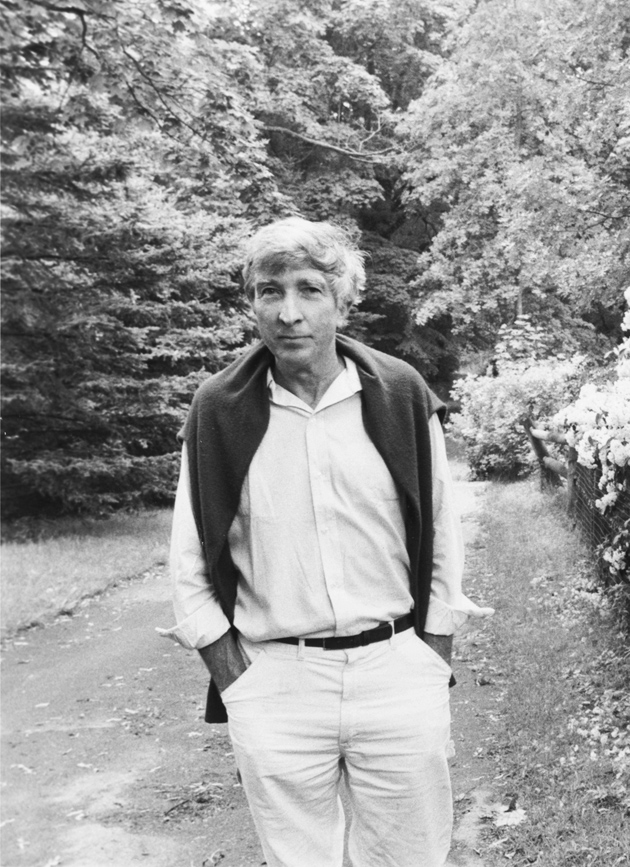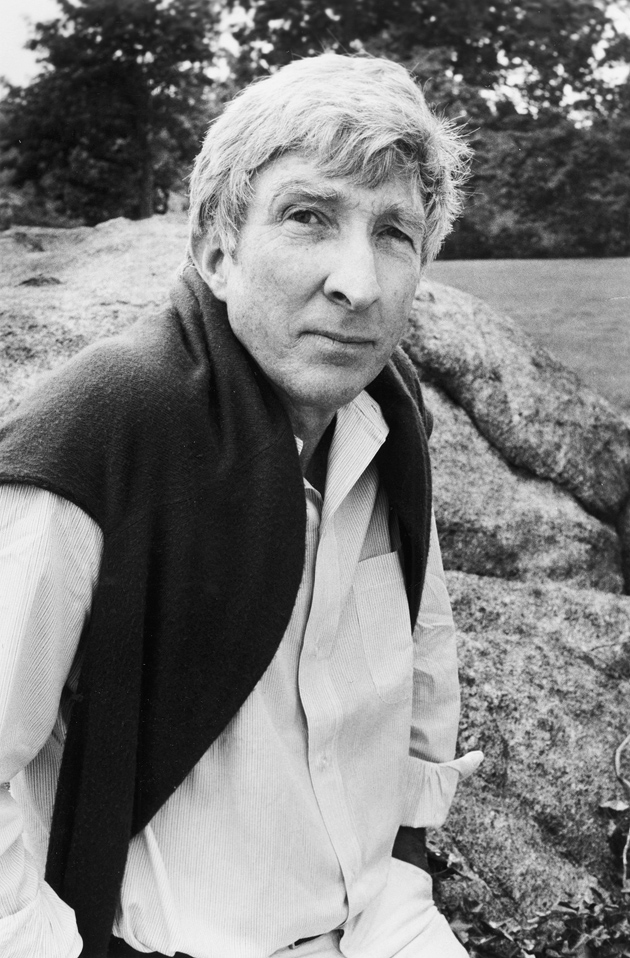In his autobiography Self-Consciousness, a “big-bellied Lutheran God” within the young John Updike looked on in contempt as he struggled to give up cigarettes. Many years later the older Updike, now giving up on alcohol, coffee, and salt, put into the mouth of that God the words of Frederick the Great excoriating his battle-shy soldiers—“Dogs, would you live forever?” But all the life-enhancing substances were set aside, and writing became Updike’s “sole remaining vice. It is an addiction, an illusory release, a presumptuous taming of reality.” In the mornings, he could write “breezily” of what he could not “contemplate in the dark without turning in panic to God.” The plain facts of life were
unbearably heavy, weighted as they are with our personal death. Writing, in making the world light —in codifying, distorting, prettifying, verbalizing it—approaches blasphemy.
And now this masterly blasphemer, whose literary schemes and pretty conceits touched at points on the Shakespearean, is gone, and American letters, deprived in recent years of its giants, Bellow and Mailer, is a leveled plain, with one solitary peak guarded by Roth. We are coming to the end of the golden age of the American novel in the twentieth century’s second half. Henry Bech, Updike’s remote Jewish other, never immune to an attack of status anxiety, mused on the teeming hordes of his gifted and despised contemporaries:
Those that didn’t appear, like John Irving and John Fowles, garrulously, Dickensianly reactionary in method seemed, like John Hawkes and John Barth, smugly, hermetically experimental. O’Hara, Hersey, Cheever, Updike—suburbanites all living safe while art’s inner city disintegrated. And that was just the Johns.
This most Lutheran of writers, driven by intellectual curiosity all his life, was troubled by science as others are troubled by God. When it suited him, he could easily absorb and be impressed by physics, biology, astronomy, but he was constitutionally unable to “make the leap of unfaith.” The “weight” of personal death did not allow it, and much seriousness and dark humor derive from this tension between intellectual reach and metaphysical dread.
In a short story from 1985, “The Wallet,” Mr. Fulham (who, we are told in the first line, “had assembled a nice life”) experiences death terrors when he takes his grandchildren to a local cinema. While “starships did special-effects battle” Fulham’s “true situation in time and space” was revealed: “a speck of consciousness now into its seventh decade, a mortal body poised to rejoin the minerals, a member of a lost civilization that once existed on a sliding continent.” This “lonely possession” of his own existence, he concludes, is “sickeningly serious.”
God makes no appearance in this story, but it is unlikely that an atheist could have conjured so much from the minor domestic disturbance that follows. First, a large check “in the low six figures,” a return on canny investments, fails to show up in the post. Fulham makes many phone calls to the company in Houston; the matter begins to loom too large—“He slept poorly, agitated by the injustice of it.” He suspects a thief, a “perpetrator,” or that there is a flaw in the mindless system. He is tormented by “outrageous cosmic unanswerableness.”
Then, the “perpetrator” strikes again. His wallet—“a friendly adjunct to his person”—vanishes. This being Updike, its contents are minutely, satirically listed, the credit, membership, and hospital cards, the priceless clippings, photographs of family and one of a long-ago lover, the obsolete receipts. Who has not searched in vain, like Fulham, returning superstitiously to the same places, trying to recreate the movements of the careless self of yesterday? But “the wallet’s non-existence rang out through the rooms like a pistol shot which leaves deafness in its wake.” In despair, Fulham exclaims to his wife,
“Without that wallet, I’m nothing.” His tongue had outraced his brain, but once he said it he realized this to be true: without the wallet, he was a phantom, flitting about in a house without walls.
At last, the check shows up, only after it has been canceled; the granddaughter finds the wallet, but only after the accounts have been frozen. The nights are cooler now and something has shifted in Fulham. He has had a near-death experience, a rehearsal, and now is reconciled to his end.
Like much that appears secular in Updike, this story is suffused with his religious seriousness—the very spirit that Philip Larkin, an atheist, famously acknowledged in his description of a church as being “A serious house on serious earth….” It is no accident that Fulham’s moments of dread come upon him in a movie house. In the opening of the major novel In the Beauty of the Lilies, Mary Pickford faints on the set of a D.W. Griffith movie, The Call to Arms, while elsewhere a clergyman is painfully losing his faith after reading a book by the atheist Robert Ingersoll and realizing “what he had long suspected, that the universe was utterly indifferent to his states of mind and as empty of divine content as a corroded kettle.” He confronts “the blood-soaked selfishness of a cosmic mayhem” and leaves the ministry to become an encyclopedia salesman. And so they are linked, cinema and religion, two grand designs conjuring light out of darkness. For Updike, cinema and its brattish child television “became our religion.” This was not a disapproving observation—in his youth, “it was the movies that moved me, and gave me something to live for, to live toward.”
Advertisement
And cinema was above all, for the young Updike, an education in sexual manners, in modes of seduction, in the codes of glances and touch and all that business with cigarettes. It was there from the very beginning, in his writing, that celebrated or infamous capacity for fastidious, clinical, visually intense, painfully and hilariously honest descriptions of men and women making love. However fleeting or disastrous the coupling, the metaphysical shadows are always on the wall—the same seriousness is in play. “Nature dangles sex to keep us walking toward the cliff,” Piet reflects in Couples. When he makes love outdoors to Georgene—“A lip of resistance, then an easeful deepness, a slipping by steps”—he is troubled that he is “under the eye of God.”
The ruthless recording eye made Updike unpopular with some women readers, especially back in the salad days of Theory, when talk of the “male gaze” was the fashion. Piet notes in Foxy’s nakedness “the goosebumped roughness of her buttocks, the gray unpleasantness of her shaved armpits….” But in Updike as in life, bodies are rarely perfect, unlike in the movies; this is fictional realism and goosebumps do not stand in the way of the lovers’ transcendent pleasure. While she fellates him “lazily,” he combs her lovely hair and reflects on her “coral cunt, coral into burgundy, with its pansy-shaped M, or W, of fur”; then it comes to him that mouths are noble. “They move in the brain’s court. We set our genitals mating down below like peasants, but when the mouth condescends, mind and body marry.”
In his last novel, The Widows of Eastwick, Updike engaged playfully with his female critics through his character Sukie, the romantic novelist. She erases from a work in progress a passage about carefully buffed fingernails digging deep “into Hercule’s broad, heaving back.” She reminds herself that a proper romance never dwells on sexual details, for it might lose its “targeted demographic of dreamy, dissatisfied women…. Women know the facts but don’t want them spelled out.”
In fact, Updike’s level unblinking gaze is not only on women, and is not confined to the physical. In Roger’s Version, when Lambert lies to his wife to conceal an infidelity, he does so, “trusting my face, that thin-skinned traitor, to back me up.” And there was never a more fallible and exposed character in modern fiction than Harry “Rabbit” Angstrom. The Rabbit tetralogy not only describes from the inside a modern man’s major and minor dishonesties, self-deceptions, special pleadings, and lumpish passivity, it also charts over four novels and more than thirty years a slow physical and mental deterioration accelerated by laziness, junk food, and American prosperity.
The tetralogy is Updike’s masterpiece and will surely be his monument. In all its detail, homely or hard-edged, and all its arenas—work, politics, retirement, and above all sex—the metaphysical is always there, sometimes a mere gleam buried in the fold of a sentence, at other times overtly, comically. In the first of the novels, Rabbit Run, when youngish Harry, the typesetter and ex-basketball player, makes love to Ruth, a small-town prostitute, their sessions are interrupted by a gut-level theological dispute about God’s existence, prompted by Sunday churchgoers in the street below. Harry, naturally, is on the side of God—“The idea of making it while the churches are full excites him.”
Many years later, he is on the operating table, watching his own insides on a screen (“the Rabbit Angstrom Show”), surrounded by machines and technocratic doctors and their satellites who “murmurously crouch over Harry’s sheeted, strategically exposed body,” conducting a three-and-a-half-hour angioplasty following his heart attack. The scene is rich in Updike’s strengths. “The mechanically precise dark ghost of the catheter is the worm of death within him. Godless technology is fucking the pulsing wet tubes we inherited from the squid, the boneless sea-cunts.” The experience is intensely unpleasant—“like his chest is being cooked in a microwave. Jesus.” He closes his eyes a few times and attempts to pray—“but it feels like a wrong occasion, there is too much crowding in, of the actual material world. No old wispy Biblical God would dare interfere.” The one consolation is that his doctor is Jewish, for Harry has a
Advertisement
gentile prejudice that Jews do everything a little better than other people, something about all those generations crouched over the Talmud and watch-repair tables, they aren’t as distracted as other persuasions, they don’t expect to have as much fun. They stay off the booze and dope and have a weakness only…for broads.
Like Bellow, his only equal in this, Updike is a master of effortless motion—between third and first person, from the metaphorical density of literary prose to the demotic, from specific detail to wide generalization, from the actual to the numinous, from the scary to the comic. For his own particular purposes, Updike devised for himself a style of narration, an intense, present tense, free indirect style, that can leap up, whenever it wants, to a God’s eye view of Harry, or the view of his put-upon wife, Janice, or his victimized son, Nelson. This carefully crafted artifice permits here assumptions about evolutionary theory, which are more Updike than Harry, and comically sweeping notions of Jewry, which are more Harry than Updike.
This at the heart of the tetralogy’s achievement. Updike once said of the Rabbit books that they were an exercise in point of view. This was typically self-deprecating, but contains an important grain of truth. Harry’s education extends no further than high school, his view is further limited by a range of prejudices and a stubborn, combative spirit, and yet he is the vehicle for a half-million-word meditation on postwar American anxiety, failure, and prosperity. A mode had to be devised to make this possible, and that involved pushing beyond the bounds of realism. In a novel like this, Updike insisted, you have to be generous and allow your characters eloquence, “and not chop them down to what you think is the right size.” He was clear too that we all sense more than we can ever put into words, and was mindful of the example of Joyce and his “great attempt to capture the way we move through life.”

The three Bech books, which Updike always listed with his short stories, have alliterative titles, like the tetralogy, and read now like a trilogy of a distinctive comic genius. Henry Bech is a Jewish-American writer whose career rises, fades horribly, and rises again to embrace the Nobel Prize denied his creator. In one of the final episodes, Bech Noir, Henry takes, rather implausibly, to murdering the critics who have offended him over a lifetime. A poisoned self-addressed envelope and a discreet shove on a crowded subway platform dispose of two with little bother. To reach another, Bech done up in cape and mask, armed with gun and silencer, climbs a fire escape with an accomplice, his current lover in a catsuit, to take the life of Orlando Cohen, an old man with emphysema, whose chaste ambition was to be “the ultimate adjudicator” of American literature and who had “refused to grant Bech a place, even a minor place, in the canon.”
They find an emaciated, enfeebled Cohen breathing oxygen through a mask with a volume of Walter Benjamin’s Selected Writings on his lap. This is comedy, high and dark, but it does not prevent the critic, minutes before his death, delivering a sharp dismissal of Bech’s work for its failure to understand America. Its core, Bech had failed to grasp, was essentially Protestant. The first settlers thought the Holy Ghost had led them to a Promised Land. Fighting for air, Cohen pronounces:
The Holy Ghost…who the hell is that? Some pigeon, that’s all…but that God-awful faith…Bech…when it burns out…it leaves a dead spot. Love it or leave it…a dead spot. That’s where America is…in that dead spot.
Bech failed to find that spot, but his creator had long ago made it his subject. That dead spot was the ruined inner city of Roger’s Version, a spoiled landscape through which a divinity professor takes a thirty-page stroll—one of the great set pieces of the entire body of work; the dead spot was the shadowy center of scores of novels and stories, in the freeways, malls, TV-addicted children, junk food, the boundless suburbs and their heartless intrigues and pursuit of ecstasy in restless, hopeful couplings, the messy divorces and their wounded children, the racial divide, the rackety politics filtered through TV screens, the national bafflement as manufacturing industries declined and the Japanese moved in with their cheaper cars.
That dead spot is probed and palpated in the ever-present metaphysics, the thwarted religious sense, or in moments when a denatured suburbanite glances up beyond the telegraph poles and wires and notices that spring is coming on and experiences a jolt of indistinct excitement that is quickly smothered; or when Harry Angstrom, waiting to receive a serve in a game of social tennis, thinks of the mounting numbers of dead in his life, and feels camaraderie for his friends, and loves the treetops around him—but cannot name a single tree, never reads a book, knows nothing, and feels his life to be threadbare.
There is in Updike always comedy or mischief in these moments of frustrated entitlement. A great writer cannot help showing us that there is something strangely comic, or antic, about the perfectly turned phrase; the precise insight into a human moment carries with it generosity and warmth, and prompts a smile of recognition. A baby “corkscrews” in its father’s arms; a newly married couple look “self-cherished, like gladioli”; when gales of Sixties social mayhem sweep through Harry’s marital home and the house has unwanted visitors and, in the dead of night, he must make love quietly to his new mistress, Updike notes that “the rooms are quadrants of one rustling heart”—a sweetly pitched observation that finds expression in an iambic pentameter.
The Updike opus is so vast, so varied and rich, that we will not have its full measure for years to come. We have lived with the expectation of his new novel or story or essay so long, all our lives, that it does not seem possible that this flow of invention should suddenly cease. We are truly bereft, that this reticent, kindly man with the ferocious work ethic and superhuman facility will write for us no more. He was intensely private, learned, generous, courtly, the kind of man who could apologize for replying to one’s letter by return mail because it was the only way he could keep his desk clear.
Contrary to what his work might suggest to a literal reader, John Updike was in actual life devoted to his large family that sprawled across the generations, so why not let one of his youngest characters take the parting bow on his behalf? When Henry Bech goes up on stage in Stockholm to make his Nobel acceptance speech, he takes with him on his hip his one-year-old daughter. She wriggles impatiently through his lecture and when at last he has finished, she reaches out for the microphone “with the curly, beslobbered fingers of one hand as if to pluck the fat metallic bud.” Bech feels the warmth of her skull, he inhales “her scalp’s powdery scent…. Then she lifted her right hand, where all could see, and made the gentle clasping and unclasping that signifies bye-bye.”
This Issue
March 12, 2009




